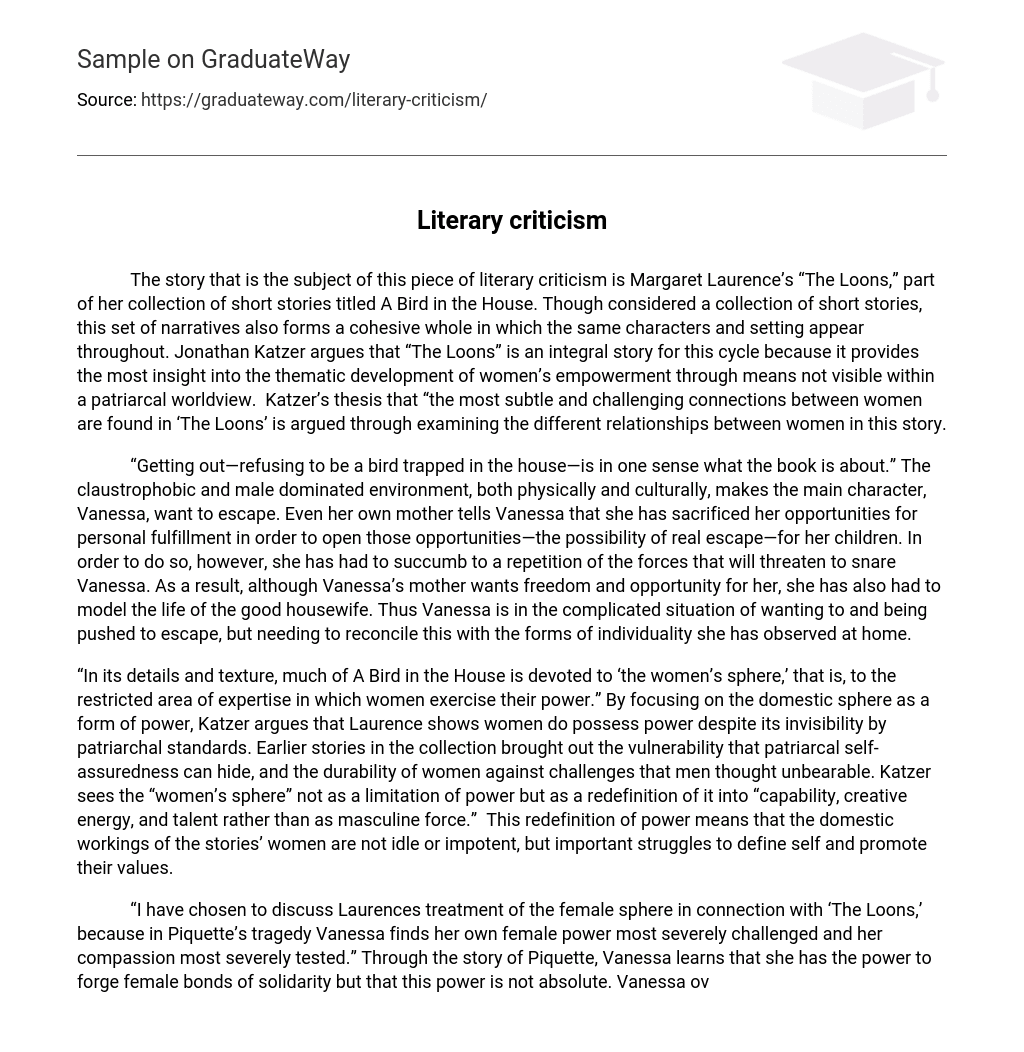The story that is the subject of this piece of literary criticism is Margaret Laurence’s “The Loons,” part of her collection of short stories titled A Bird in the House. Though considered a collection of short stories, this set of narratives also forms a cohesive whole in which the same characters and setting appear throughout. Jonathan Katzer argues that “The Loons” is an integral story for this cycle because it provides the most insight into the thematic development of women’s empowerment through means not visible within a patriarcal worldview. Katzer’s thesis that “the most subtle and challenging connections between women are found in ‘The Loons’ is argued through examining the different relationships between women in this story.
“Getting out—refusing to be a bird trapped in the house—is in one sense what the book is about.” The claustrophobic and male dominated environment, both physically and culturally, makes the main character, Vanessa, want to escape. Even her own mother tells Vanessa that she has sacrificed her opportunities for personal fulfillment in order to open those opportunities—the possibility of real escape—for her children. In order to do so, however, she has had to succumb to a repetition of the forces that will threaten to snare Vanessa. As a result, although Vanessa’s mother wants freedom and opportunity for her, she has also had to model the life of the good housewife. Thus Vanessa is in the complicated situation of wanting to and being pushed to escape, but needing to reconcile this with the forms of individuality she has observed at home.
“In its details and texture, much of A Bird in the House is devoted to ‘the women’s sphere,’ that is, to the restricted area of expertise in which women exercise their power.” By focusing on the domestic sphere as a form of power, Katzer argues that Laurence shows women do possess power despite its invisibility by patriarchal standards. Earlier stories in the collection brought out the vulnerability that patriarcal self-assuredness can hide, and the durability of women against challenges that men thought unbearable. Katzer sees the “women’s sphere” not as a limitation of power but as a redefinition of it into “capability, creative energy, and talent rather than as masculine force.” This redefinition of power means that the domestic workings of the stories’ women are not idle or impotent, but important struggles to define self and promote their values.
“I have chosen to discuss Laurences treatment of the female sphere in connection with ‘The Loons,’ because in Piquette’s tragedy Vanessa finds her own female power most severely challenged and her compassion most severely tested.” Through the story of Piquette, Vanessa learns that she has the power to forge female bonds of solidarity but that this power is not absolute. Vanessa overcomes the differences between herself and Piquette to recognize their shared womanhood, but then also sees that Piquette is too culturally different for them to become intimate. Vanessa truly learns the value of female power because to use an ability successfully one must also know its limitations.
Katzer shows how Vanessa’s relationships with different women teach her about the different kinds of power women and wield. In this he departs from previous critics who have criticized “the weakness of the women in the book, who are too fussy and pessimistic.” To the contrary, the weakness of these women is only a disguise or a ruse that allows them to go on doing their private labors undisturbed.





